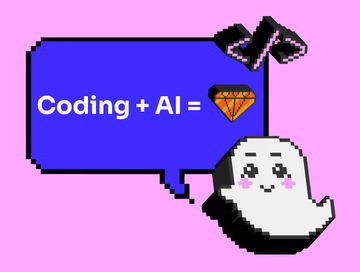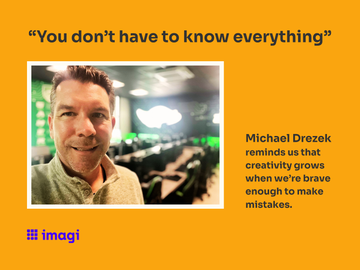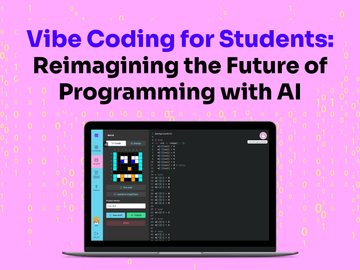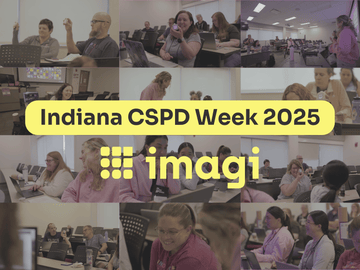
Learning coding skills goes beyond just securing a job a tech
For years, coding skills have been seen as the key to securing a high-paying job. With AI's rapid advancements, some fear the need to teach coding skills in schools is diminishing. If coding were only about securing a job as a developer, these concerns might be valid. However, at imagi, we believe teaching coding can have a much broader purpose and impact. Learning to code empowers students to engage with the digital world, build resilience, and approach challenges methodically. It’s about preparing our students to be adaptable, analytical thinkers in an increasingly tech-driven society.
When we founded imagi, our mission wasn't solely to produce the next generation of software engineers. Instead, we focused on empowering girls by making coding fun, accessible, and relevant across many different disciplines. We wanted girls to feel included in tech and confident that they could use coding skills, which we believe include critical thinking, problem-solving, creativity skills, and more, to shape the future, whatever their interests may be. Our logic was simple:
If tech = future
And women ≠ tech
Then women ≠ future
Building equity in tech starts with accessible coding education
This equation has since expanded to include other underrepresented groups. We realised if we could empower all educators—regardless of their computer science background—to teach coding in a way that is more inclusive and accessible and builds confidence in all students, we can help build a more diverse and inclusive tech industry, where tech can benefit everyone and not just a privileged few.
If tech = future
And diversity ≠ tech
Then diversity ≠ future
Recently, headlines like "Coding is Dead" have surfaced, fueled by statements from leaders like NVIDIA CEO, Jensen Huang. He suggested that AI would make traditional coding unnecessary and that coding in a programming language could be replaced by simple human language. While this perspective may hold some truth, it also risks oversimplifying the conversation and ignoring the broader importance of building digital literacy skills within our students.
AI will transform, not eliminate computer science education
It’s important to distinguish between coding, computer science, and the broader tech industry. The rise of AI will certainly transform how we teach and learn computer science, but not eliminate its necessity. Just as calculators didn't negate the need for learning mathematics, AI will enhance—not replace—coding education. Understanding AI, how it works, and the fundamentals of coding remains crucial, especially for our students, if we want them to be successful in a world increasingly shaped by AI.
AI has already demonstrated its ability to enhance coder efficiency. Tools like Copilot assist developers in writing code faster, but it's still essential for them to understand coding fundamentals to ensure the code is accurate and meets the necessary requirements. Similarly, ChatGPT can help with tasks like checking grammar in an email or generating essay topics, but the writer must ultimately judge whether the tone and grammar are appropriate or if the essay topic is suitable for the prompt. In all fields, while AI can improve efficiency and support understanding, it's crucial to teach fundamental skills and critical thinking to evaluate the accuracy of AI-generated information.
imagi’s approach to teaching students about coding and AI
As we prepare children for the future, we face the challenge of adapting to this rapidly changing world. Educators, in particular, are tasked with evolving their skill sets faster than ever before to keep pace with new developments. In the field of computer science—young and rapidly evolving—this challenge is especially prevalent.
When imagi considered how to harness AI’s power in our tools, we prioritized creating a feature that would meaningfully improve the experiences of our end users—teachers and students alike. We asked ourselves how this feature could align with our hypothesis that coding and tech skills will be strengthened, rather than replaced by AI, and how it could also serve as a tool to teach students about AI itself. After months of work and gathering valued feedback from the educators we support, we’re excited to announce that we will be launching an AI-powered debugging buddy within the imagi Edu platform.

The goals of the Debugging Buddy are to:
-
Empower Teachers: The tool removes the burden from non-computer science teachers of having to be Python syntax experts.
-
Foster Critical Thinking: The tool encourages students to ask thoughtful questions, promoting deeper learning and problem-solving skills.
-
Build Confidence: By acting as a supportive "buddy," the tool helps build students' confidence, even during moments of frustration or uncertainty.
-
Encourage Perseverance: It supports students in persisting through challenges, offering gentle guidance without providing direct answers.
-
Promote Independent Learning: The tool encourages students to try solving problems on their own first, fostering self-reliance and independent thinking.
-
Support Positive AI Engagement: The tool provides exposure to AI in a positive way, enhancing comfort and curiosity about technology.
We invite you to experience this AI-enhanced coding and computer science learning journey. The Debugging Buddy is launching on September 16th, 2024 and you will be able to try it for free until October 18th, 2024 directly within your imagi Edu account, after which it will continue to be available for imagi Edu Pro users (paid subscription). We can't wait to hear your feedback and see how it will supercharge both your and your students’ learning and creativity!
We also hope you join us in advocating for the importance of ensuring that students of all backgrounds have the opportunity to succeed in our tech and AI-driven future.
About the Author

Dora is co-founder and CEO of imagi, shaping the future tech workforce through innovative computer science education.
She earned a Neuroscience / Computer Science degree from NYU Abu Dhabi followed by MSc studies in Human Computer Interaction from KTH Royal Institute of Technology, studying across 4 continents thanks to merit based scholarships. Dora has worked as a software developer at Morgan Stanley and UX Designer at Cisco.
Dora has been recognized on the Forbes 30 Under 30 2021 list as one of Europe’s leading social entrepreneurs and serves as a Cartier Women’s Initiative Fellow.




